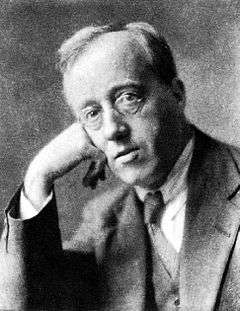Sāvitri (opera)
Sāvitri is a chamber opera in one act with music composed by Gustav Holst, his Opus 25, to his own libretto. The story is based on the episode of Savitri and Satyavan from the Mahābhārata, which was also included in Specimens of Old Indian Poetry (Ralph Griffiths) and Idylls from the Sanskrit.[1] The opera features three solo singers, a wordless female chorus, and a chamber orchestra of 12 musicians (consisting of 2 Flutes, a Cor Anglais, 2 String Quartets and a Double Bass). Holst had made at least six earlier attempts at composing opera before arriving at Sāvitri.
| Operas by Gustav Holst |
|---|
 |
|
Performance history
The opera was first given in an amateur performance at Wellington Hall, London on 5 December 1916. Holst had intended the work to be performed "in the open air, or else in a small building".[2] Its first professional performance, conducted by Arthur Bliss, was staged on 23 June 1921 at the Lyric Theatre, Hammersmith with Dorothy Silk in the title role, Steuart Wilson as Satyavan, and Clive Carey as Death.[3]
Critical appreciation
Holst's friend and fellow composer Ralph Vaughan Williams noted Holst's use of modal style in the opera.[4] John Warrack has commented on Holst's use of bitonality at the opening of the opera, representing the distinct yet subtly connected realms of Sāvitri and Death.[5] Donald Mitchell, in his highly critical comments on the opera, noted the influence of Richard Wagner in the vocal style,[6] even as Holst had nominally renounced the epic scale of Wagner's operas in terms of size of musical forces.[7] Byron Adams has described the opera's characters as more "archetypes" than people.[8] By contrast, Andrew Clements has written highly of how well the opera combines 'Eastern' culture into a 'Western' music format.[9]
Synopsis
Sāvitri, wife of the woodman Satyavān, hears the voice of Death calling to her. He has come to claim her husband. Satyavān arrives to find his wife in distress, but assures Sāvitri that her fears are but Māyā (illusion):[10] "All is unreal, all is Māyā." Even so, at the arrival of Death, all strength leaves him and he falls to the ground. Sāvitri, now alone and desolate, welcomes Death. The latter, moved to compassion by her greeting, offers her a boon of anything but the return of Satyavān. Sāvitri asks for life in all its fullness. After Death grants her request, she informs him that life is impossible without Satyavān. Death, defeated, leaves her. Satyavān awakens. Even "Death is Māyā".
Recordings
- Decca: Dame Janet Baker, Robert Tear, Thomas Hemsley; Purcell Singers; English Chamber Orchestra; Imogen Holst, conductor
- Hyperion CDH55042 (Helios reissue): Felicity Palmer, Philip Langridge, Stephen Varcoe; The Richard Hickox Singers; City of London Sinfonia; Richard Hickox, conductor (1983)
- Phoenix PHCD 14: Jessica Miller, Simon O’Neill, Kyu Won Han; Manhattan School of Music Opera Theater; Manhattan Chamber Sinfonia; Glen Barton Cortese, conductor
References
- Head, Raymond (September 1988). "Holst and India (III)". Tempo. New Series (166): 35–40. doi:10.1017/S0040298200024293. JSTOR 945908.
- Ottaway, Hugh (June 1974). "Holst as an Opera Composer". The Musical Times. 115 (1576): 473–474. doi:10.2307/957953. JSTOR 957953.
- I Holst, p. 86
- Vaughan Williams, Ralph (October 1920). "Gustav Holst (Continued)". Music & Letters. 1 (4): 305–317. doi:10.1093/ml/1.4.305. JSTOR 726997.
- Warrack, John (September 1974). "Holst and the Linear Principle". The Musical Times. 115 (1579): 732–735. doi:10.2307/957840. JSTOR 957840.
- Mitchell, Donald (November 1956). "London Concerts and Opera". The Musical Times. 97 (1365): 596–597. doi:10.2307/938276. JSTOR 938276.
- Colin Matthews, liner notes to Hyperion Recording of Sāvitri, CDH55042 (2000 reissue).
- Adams, Byron (Winter 1992). "Review of Gustav Holst: The Man and His Music by Michael Short". The Musical Quarterly. 76 (4): 584–591. doi:10.1093/mq/76.4.584. PMC 493520. Retrieved 2017-02-19.
- Andrew Clements (2004-05-20). "Savitri (Symphony Hall, Birmingham)". The Guardian. Retrieved 2007-07-14.
- Trend, J.B. (October 1921). "Savitri, an Opera from the Sanskrit". Music & Letters. 2 (4): 345–350. doi:10.1093/ml/2.4.345.
- Sources
- Holst, Imogen, A Thematic Catalogue of Gustav Holst's Music, London: Faber Music, 1974. ISBN 0-571-10004-X